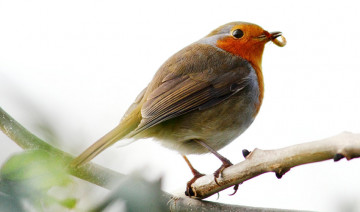
Summer Wild Bird Safety Tips
Summer is a great season to enjoy wild birds, from feathered guests visiting feeders or splish-splashing in baths to baby birds fluttering out of the nest for the first time. There are many hazards birds face in the summer, however, and conscientious birders and nature lovers can take steps to make their yards safer for all the birds that visit.
Summer Hazards for Wild Birds
The summer months can be rich, bountiful, and productive for all wildlife, but there are many hazards to overcome at the same time, particularly for wild birds. In summer, birds must face…
- Greater numbers of hungry predators, including predators hunting for their own families
- Storms that topple nests or flood feeding areas, including thunderstorms and tornadoes
- Wildfires that destroy habitat, nesting areas, and critical food sources
- Excessive heat that disrupts food production and eliminates water sources
- Chemical treatments from fertilizers, pools, and other potentially toxic sources
- Illnesses that spread at dirty bird feeders or bird baths
- Deadly traps set for other pests, such as sticky traps or poisons used for rodents
- Unsafe bird houses that lack ventilation or safety features to protect nestlings
- Window collisions that can be deadly for many species of birds
- Excessive disruption from human activities, including campers, fireworks, and more
While it may seem that there are unending hazards threatening wild birds throughout the summer, it is easier than many people realize to take steps to keep birds and other wildlife safe.
Keeping Wild Birds Safe in Summer
The key to summer wild bird safety is to provide a safe and healthy environment for the birds. To do so…
- Provide Nutritious Food
Birds need a great deal of food during the summer, not only for their own energy needs as they avoid different hazards, but also to nourish growing hatchlings. The best foods are calorie-rich options such as sunflower seed, no-melt suet, mealworms, fruit, nectar, and nuts. Jelly can also be offered to summer birds such as orioles and grosbeaks, but only offer jelly in small quantities so it does not go rancid before the birds eat it.
- Clean Feeders and Baths
Bird feeders and baths should be cleaned regularly throughout the summer. Seed feeders should be cleaned weekly, while nectar and jelly feeders should be cleaned every 2-3 days. Don’t forget to clean under bird feeders as well, removing rotten hulls and accumulated feces that can spread diseases. Bird baths should be cleaned and disinfected with a weak bleach solution every time they are refilled to ensure no bacteria is transmitted through dirty water.
- Provide Safe Bird Houses
A safe bird house is one with adequate drainage and ventilation to keep nesting birds comfortable, and it should be appropriately sized for the species so baby birds do not smother. The house should also be protected from predators by using baffles or entrance guards, and the entrance hole should be the proper size for its residents.
- Minimize Outdoor Chemicals
Outdoor chemical treatments of all kinds – fertilizers, herbicides, pesticides, etc. – should be minimized in summer so birds and other wildlife are not contaminated by dangerous toxins. Also take note of other potential chemical leaks, such as drips from a leaking engine, spillover from a recently cleaned pool, or improper chemical storage in garden sheds.
- Discourage Stray and Feral Cats
Outdoor cats are a grave threat to wild birds in summer, especially young birds that haven’t yet strengthened their flight abilities. Keep pet cats indoors, and use appropriate fencing, scent barriers, humane traps, or other means to minimize the risk from other outdoor cats.
- Make Windows More Visible
Taking steps to make windows more visible can help birds avoid dangerous collisions. Use frosted tape to create designs on the windows, or place decals on the glass so birds can see it more easily. Closing curtains or blinds to eliminate visual corridors or even just leaving glass a bit dirtier to reduce reflections can help birds be aware of this hazard.
- Teach Children to Respect Birds
Children have wonderful curiosity about nature, but teach them to exercise that curiosity in respectful, responsible ways by not disturbing nests and leaving baby birds alone when they may be found on the ground. Get kids involved with summer birds by designating one feeder as their very own and teaching them how to care for the feeder and refill it with the best foods for summer’s hungry birds.
- Plant Native Shrubbery and Flowers
Fill your landscaping with native plants birds and other wildlife will recognize and appreciate, and you can create a great habitat for all the wild birds that visit. Choose flowers and plants that will provide berries, nectar, seeds, and nuts for food sources, and plant in layers or thicket-like sections that can create shelter and safety for visiting birds.
When Birds Need Help
In addition to creating a safe, bird-friendly habitat in summer, it is important to know when birds might need help. Learn how to tell the difference between helpless baby birds and those that are out of the nest on purpose and stretching their wings, and be able to recognize the signs of a sick or injured bird. Keep bird and wildlife rehabilitator contact information nearby, and know where local wildlife rescue facilities are in case injured birds or animals need extra care. By promoting summer wild bird safety and knowing how to help birds, you can be sure all summer birds have the best care to survive what can be a harsh and demanding season.

